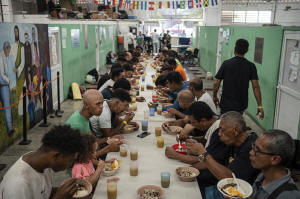Trump's foreign aid freeze guts grassroots groups helping migrants in
Latin America
 Send a link to a friend
Send a link to a friend
 [February 01, 2025]
By MEGAN JANETSKY, MARIA VERZA and JOSHUA GOODMAN [February 01, 2025]
By MEGAN JANETSKY, MARIA VERZA and JOSHUA GOODMAN
MEXICO CITY (AP) — A busy shelter for migrants in southern Mexico has
been left without a doctor. A program to provide mental health support
for LGBTQ+ youth fleeing Venezuela was disbanded. In Colombia, Costa
Rica, Ecuador and Guatemala, so-called “Safe Mobility Offices” where
migrants can apply to enter the U.S. legally have shuttered.
Barely a week into Donald Trump’s new administration, his order to halt
U.S. foreign assistance is having a profound effect on an issue that
propelled him to the White House: migration.
Across Latin America, grassroots organizations that assist migrants have
been gutted, the already perilous trek northward has become more
confusing and the future of programs to root out the violence, poverty
and human rights abuses that has driven historic levels of migration in
recent years are hanging by a thread.
Trump, within hours of taking office Jan. 20, ordered a sweeping 90-day
freeze on most U.S. foreign assistance disbursed through the State
Department. The decision immediately halted thousands of U.S.-funded
humanitarian, development and security programs worldwide, forcing U.S.
aid organizations and partners in the field to slash hundreds of aid
workers.
The United States is the world’s largest source of foreign assistance by
far, although several European countries allocate a much bigger share of
their budgets. While aid to Africa dwarfs the roughly $2 billion that
Latin America receives annually, the Western Hemisphere has long been a
spending priority of both Democratic and Republican administrations.
The region is closely tied to the U.S. through trade and migration as
well as the flow of narcotics. And the rising influence of China and
Russia in recent years has only enhanced the strategic importance of
what used to be referred to, disparagingly, as “Washington's backyard.”

It's a message that Secretary of State Marco Rubio is likely to
reinforce when starting Saturday he visits Panama, El Salvador, Costa
Rica, Guatemala and the Dominican Republic in his first official
overseas trip.
Shelter has been appealing for alternate funding
Trump has made it a priority to deter migrants from entering the U.S.
illegally and many of the aid programs he halted are funded through the
State Department's Bureau of Population, Refugees, and Migration, which
provides humanitarian assistance to those fleeing persecution, crisis,
or violence.
One such beneficiary is the Peace Oasis of the Holy Spirit Amparito
shelter in the southern Mexican city of Villahermosa. The shelter has
been treading water for months as Mexican authorities — under pressure
from the U.S. to stem migration flows — have dumped migrants rounded up
throughout the country.
The aid freeze dealt another blow, forcing the charitable organization
that runs the facility to fire its only doctor as well as a social
worker and child psychologist.
In the days since Trump's order, the shelter has been appealing to the
Mexican government for alternate funding for programs managed by the
United Nations to pay for flights and bus rides to Mexico's southern
border with Guatemala for migrants who want to return home. Currently,
four families from Honduras, Ecuador and El Salvador are stranded.
“The crisis is only going to worsen,” the shelter said in a statement.
“The most affected will be the population we serve.”
Psychological, physical, and sexual abuse
Some 1,500 miles (2,400 kilometers) away from Villahermosa, in the
Colombian capital of Bogota, aid workers are also scrambling.
The city is a major hub for the more than 7 million Venezuelans who have
fled economic collapse and abuse under Nicolás Maduro's increasingly
authoritarian rule. Colombia is also the starting point for the more
than 800,000 migrants — the majority Venezuelan — who have set out the
past two years on the dangerous trek northward through once impenetrable
Darien Gap connecting Central and South America on their way to the U.S.
Among the most marginalized migrant groups are LGBTQ+ youth, who suffer
significantly higher rates of psychological, physical, and sexual abuse.
The Human Rights Center at the University of California, Berkeley, for
the past year has been readying a U.S.-funded project to provide mental
health support to LGBTQ+ teenagers, from Venezuela as well as Colombians
internally displaced by decades of armed conflict.
[to top of second column]
|

Migrants eat lunch at the Peace Oasis of the Holy Spirit Amparito
shelter in Villahermosa, Mexico, June 7, 2024. (AP Photo/Felix
Marquez, File)

Leila Younes, a Lebanese gender specialist, had just arrived in
Bogota to launch the project when she saw the devastating email with
the stop-work order by the State Department. After breaking the news
to local partners, she immediately returned home — and now the Human
Rights Center is urgently seeking $300,000 to continue the research
"We spent a year preparing with our partners, and overnight, we were
told to stop,” said Younes. “No transition, no time to secure other
funding.”
Trump's first administration funded several programs
Although the White House only paused humanitarian assistance for 90
days pending further review, Younes said she's under no illusion the
work — and a sister project in Poland among Ukrainian youth fleeing
the war with Russia — will resume. Trump on the campaign trail
repeatedly blasted transgender youth and has issued sweeping orders
instructing the federal government to terminate diversity, equity
and inclusion initiatives.
“This isn’t just a funding cut—it’s part of a rollback on LGBTQI+
rights,” said Younes.
The first Trump administration funded several programs by Colombia,
Ecuador and Peru to integrate the Venezuelan diaspora as well as
those by Costa Rica to resettle opponents of Nicaraguan President
Daniel Ortega. The aid aligned closely with Trump's foreign policy
goals to isolate anti-democratic governments and helped discourage
migrants from heading to the U.S., said Andrew Selee, president of
the Migration Policy Institute in Washington.
“We’re likely to see much of the foreign assistance in the region
understood through a migration lens,” said Selee. “That means
stopping funding for programs that support migrants in transit but
perhaps increasing funding for efforts to integrate returned
migrants and those already living in other countries in the region.”
What is less likely to resume, says Selee, is foreign aid attacking
the root causes of migration — a priority, at least initially, of
the Biden administration. Trump has also suspended offices opened by
Biden in Colombia, Costa Rica, Ecuador and Guatemala where migrants
could apply for asylum and other legal pathways to enter the U.S.
instead of trekking to the border.
‘Trust isn’t something you can turn on and off’
Traditionally, U.S. funding in Latin America has been channeled to
support everything from child health nutrition, legal reform and
press freedom. By far the biggest chunk funds security assistance to
combat gangs, eradicate illegal crops and strengthen the rule of
law.
Liliana Ayalde, a former American ambassador to Brazil and Paraguay,
said long term investments in state-building like the more than $10
billion spent on “Plan Colombia” since 2000 generate enormous
goodwill even if it is difficult to measure the number of people who
chose not to uproot as a result of such assistance.
“Trust isn’t something you can turn on and off in a conflict zone,”
said Ayalde, who started her diplomatic career at the U.S. Agency
for International Development and now serves on the board of two
non-profit organizations who also saw their funding cut. “Partners
aren’t going to trust the U.S. again if they don’t feel safe and
think we’re in it for the long haul.”
That may be good news for China, Washington’s top adversary for
influence in Latin America. As Latin America has faded from the U.S.
foreign policy agenda since the end of the Cold War, China has made
deep inroads through billions in infrastructure investment and
no-string attached lending.
“Champagne bottles are uncorking right now in Beijing,” said Adam
Isacson, who has studied foreign aid trends for years and directs
the defense oversight program at the Washington Office on Latin
America. “It's really hard for the U.S. to compete with a
geopolitical rival when we're disarming unilaterally.”
____
Goodman reported from Miami. AP reporter Sonia Perez in Guatemala
City and Astrid Suarez in Bogota, Colombia contributed to this
report.
All contents © copyright 2025 Associated Press. All rights reserved
 |